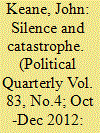|
|
|
Sort Order |
|
|
|
Items / Page
|
|
|
|
|
|
|
| Srl | Item |
| 1 |
ID:
109331


|
|
|
|
|
| Publication |
2011.
|
| Summary/Abstract |
Using a case-study, inductive, narrative approach, this article explores the history, drivers, benefits, and barriers to the Bakun Hydroelectric Project in East Malaysia. Situated on the island of Borneo, Bakun Dam is a 204 m high concrete face, rock filled dam on the Balui River in the Upper Rajang Basin in the rainforests of Sarawak. Bakun Dam and its affiliated infrastructure could be the single largest and most expensive energy project ever undertaken in Southeast Asia. Based on data collected through site visits, original field research in Sarawak, and more than 80 research interviews, the article begins by teasing out the complex history and drivers behind the Bakun project before identifying a set of potential social, political, and economic benefits the project could deliver. It then delves into six sets of barriers in the technical, economic, political, legal and regulatory, social, and environmental realms. We find that Bakun illustrates how centralized energy megaprojects, while ostensibly championed for reasons of economies of scale and the ability to bring about transformational change in the shortest period of time, often fail to address broader development goals such as fighting energy poverty and improving the livelihoods of the local communities they are supposed to serve.
|
|
|
|
|
|
|
|
|
|
|
|
|
|
|
|
| 2 |
ID:
169882


|
|
|
|
|
| Summary/Abstract |
Several studies have investigated large scale renewables, electricity networks and the potential for a supergrid, both in the US and the Europe. However, much of this work is focused on technical and economic barriers and under-recognises social, political and other non-technical aspects. This paper builds a conceptual framework to analyse the non-technical barriers, engagement of stakeholders and social risks to the proposed supergrids in the US and Europe. In doing so, we find 12 different non-technical situations (barriers) on each region that are present in the implementation of a supergrid, and can help guide the development of these economically efficient projects to address the social barriers and risks that they may face. From our results, we suggest a set of policy recommendations, parting with the introduction of an overarching body of governance for the coordination and implementation of the supergrid. This, we hope, provides a map and encouragement for policymakers, investors and stakeholders looking to develop and complete these megaprojects; recognising that some configuration of a supergrid is required to achieve a full penetration of renewables. Therefore, the results of this paper have a significant contribution in decarbonising energy production and supply systems, complying with national and international climate ambitions.
|
|
|
|
|
|
|
|
|
|
|
|
|
|
|
|
| 3 |
ID:
118215


|
|
|
|
|
| Publication |
2012.
|
| Summary/Abstract |
Megaprojects are systems of highly concentrated power whose footprints, or radius of effects, are without precedent in human history. Once upon a time, even under imperial conditions, most people on our planet lived and loved, worked and played within geographically limited communities. They never had to reckon with all of humanity as a factor in their daily lives. Whenever they acted recklessly within their environment, for instance, they had the option of moving on, safe in the knowledge that there was plenty of Earth and not many others. Whenever bad things happened, they happened within limits. Their effects were local. The politics of megaprojects radically alters this equation; it poses new questions about the governance of risk and the nature and limits of democratic politics. The politics of megaprojects-put simply-raises fundamental questions about the 'life and death of democracy'.
|
|
|
|
|
|
|
|
|
|
|
|
|
|
|
|
|
|
|
|
|